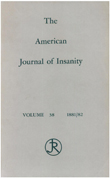Increases in CSF levels of interleukin-2 in schizophrenia: effects of recurrence of psychosis and medication status
Abstract
OBJECTIVE: Interleukin-2, traditionally viewed as solely involved in immunological events, has recently been shown to exert profound effects on the development and regulation of the central nervous system. This study examined the relationships between interleukin-2 in the CSF and plasma of schizophrenic patients and clinical measures, including relapse and medication status. Plasma and CSF interleukin-1 alpha levels were also measured to ascertain the specificity of changes in cytokine levels. METHODS: Seventy-nine physically healthy male patients with schizophrenia (DSM-III-R) received diagnostic evaluation and behavioral ratings. Haloperidol treatment was withdrawn for up to 6 weeks and patients were evaluated for symptom recurrence. CSF and plasma were obtained by established procedures before haloperidol withdrawal (N = 79) and after (N = 64). RESULTS: CSF levels of interleukin-1 alpha decreased significantly after haloperidol withdrawal but showed no relation to clinical status. In contrast, levels of CSF interleukin-2 were associated with recurrence of psychotic symptoms. Relapse-prone patients, examined both while medicated and after drug withdrawal, had significantly higher levels of CSF interleukin-2 than patients who did not relapse. CSF interleukin-2 level during haloperidol treatment was a significant predictor of worsening in psychosis. CONCLUSIONS: Levels of interleukin-2, a molecule that plays both neurodevelopmental and neuroregulatory roles, may have a role in relapse in schizophrenia. Levels of CSF interleukin- 2 appear to be affected by relapse mechanisms, while peripheral blood levels are not. These changes are specific to interleukin-2, since levels of interleukin-1 alpha were affected by medication withdrawal but not by change in clinical state.
Access content
To read the fulltext, please use one of the options below to sign in or purchase access.- Personal login
- Institutional Login
- Sign in via OpenAthens
- Register for access
-
Please login/register if you wish to pair your device and check access availability.
Not a subscriber?
PsychiatryOnline subscription options offer access to the DSM-5 library, books, journals, CME, and patient resources. This all-in-one virtual library provides psychiatrists and mental health professionals with key resources for diagnosis, treatment, research, and professional development.
Need more help? PsychiatryOnline Customer Service may be reached by emailing [email protected] or by calling 800-368-5777 (in the U.S.) or 703-907-7322 (outside the U.S.).



